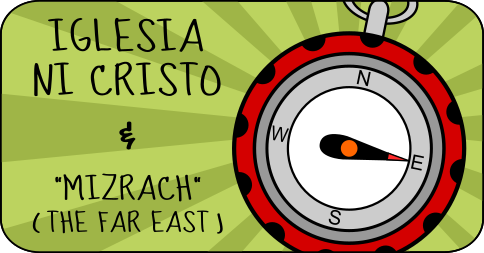Does the Hebrew word "mizrach" refer to the Philippines?

The "Iglesia Ni Cristo" claims that the Hebrew word "mizrach" means "far east" and often refers specifically to the Philippines, given it's geographical position. Is this accurate?
when we examine biblical Hebrew and the history of language, we see that the INC is very misguided in claiming that "mizrach" refers to the the Philippines.
The phrases "far east" did not refer to east Asia during the time of the Old Testament.
The phrase "far east", as referring specifically to east Asia, was first recorded and popularized only in the past 1000 years.[1][2] To say that Isaiah or any other Old Testament author must have been speaking of Asia - and more specifically, the Philippines - is a terrible anachronism. That is, it assumes that Isaiah used words and phrases that didn't exist until long after he died. There is no reason to think that "far east" in the Old Testament should refer to the Asia, given that Isaiah had never heard the phrase "far east" used that way.
The vast majority of Bible versions translate "mizrach" as "east".
The INC quotes the Moffatt version of the Bible for verses that contain the word "mizrach". The Moffatt translates "mizrach" as far east, and it serves the theological motivations of the INC to use this version here where it is convenient for them.
However, the INC must answer why a rogue translation is more accurate than countless other Bible translations. Why is it that countless of Hebrew scholars translate "mizrach" as "east", and only Moffatt, who didn't even intend a literal translation, use the phrase "far east"? The INC has never attempted to answer such a question. Indeed, they cannot.

The word "mizrach" is often used to contrast with the west.
The INC cites an encyclopedia written in the 1800s in order to demonstrate that this the word "mizrach" should be translated as "far east".[3] They seem to think the entry in this encyclopedia supports their translation when it does precisely the opposite. One may read the entire paragraph[4], but here are some relevant quotes from the very same paragraph the INC cites:
it is natural that kedem be used when the four quarters of the world are described and mizrach when the east is only being distinguished from the west.
In other words, "mizrach" is not always used because it refers to a distant east. Sometimes it is used to contrast with the west.

The word "mizrach" refers to an unspecified east.
Now lets look at more of the specific sentence which the INC lifts from the article.
Again, kedem is used in a strictly geographical sense to describe a spot or country immediately before another in an easterly direction...on the other hand, mizrach is used of the far east with a less definite signifaciation.
What the article is saying is not that mizrach literally means "far east", but that it means an unspecified east, which may not be in immediate proximity. For example, if there were six cities - A, B, C, D, E, F - in a line:
(West) A --- B --- C --- D --- E --- F (East)
B would be "kedem" of A, but any of C through F could be considered "mizrach" of A, because "mizrach" does not mean immediately to the east.
Conclusion
The INC has no legitimate reason to believe that "mizrach" refers to east Asia, let alone the Philippines specifically. First, they force anachronism on the text when they make "far east" and "far west" take on a modern meaning. Second, they affirm a faulty translation by citing an article which does not even agree with their use of "mizrach".
The words of God are sweeter than honey (Psa 119:103). It is disrespectful to twist these words to serve one's own theology. It would be better to repent of this twisting of scripture and believe the true gospel so that God's wrath will be removed.
[1] dictionary.com says the first recorded instance was in 1616 and it was popularized in the 1800s.
[2] Others report the phrase originating as early as the 1200s (See Wikipedia. Regardless of this discrepancy, the point still remains that the phrase did not refer specifically to the Philippines until long after Isaiah wrote the Old Testament.
[3] INC article that cites the Cyclopedia of Biblical, Theological, and Ecclesiastical Literature
